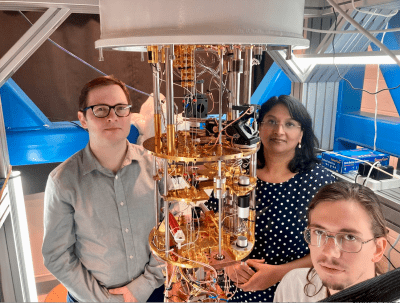 Professors Jain and Sochnikov received NSF research grant entitled “New Quantum Elastocaloric Demagnetization Refrigeration for the Millikelvin Range”. A major focus of their research will be the cooling of quantum chips. For this purpose, their teams will study ‘spin liquids’, which can be harnessed to achieve millikelvin temperatures without magnetic fields. At such low temperatures, quantum phase transitions drive cryocooling. This research uses novel techniques to induce and tune these types of phase transitions. In the future, this research will transform our ability to build energy-efficient, large-scale quantum computers.
Professors Jain and Sochnikov received NSF research grant entitled “New Quantum Elastocaloric Demagnetization Refrigeration for the Millikelvin Range”. A major focus of their research will be the cooling of quantum chips. For this purpose, their teams will study ‘spin liquids’, which can be harnessed to achieve millikelvin temperatures without magnetic fields. At such low temperatures, quantum phase transitions drive cryocooling. This research uses novel techniques to induce and tune these types of phase transitions. In the future, this research will transform our ability to build energy-efficient, large-scale quantum computers.
Research
Posts related to the research mission of the Physics Department
Prof. Jain is organizing International Workshop on Oxide Electronics
Associate Professor of Physics Menka Jain and the Institute of Materials Science is co-organizing a workshop-28th International Workshop on Oxide Electronics (IWOE) in Maine next month. The IWOE series has become an important venue to discuss recent advances and emerging trends in this developing field. The aim of the workshop is to provide an interdisciplinary forum for researchers – theorists as well as experimentalists – on understanding the fundamental electronic and structural properties and also on the design, synthesis, processing, characterization, and applications of (epitaxial) functional oxide materials. Results of critical scientific importance as well as studies revealing the technological potential of functional oxide thin films to create devices with enhanced performance will be showcased. The other committee members are: https://iwoe28.events.yale.edu/committees
Dr. Jain designed the logo of the workshop as well. 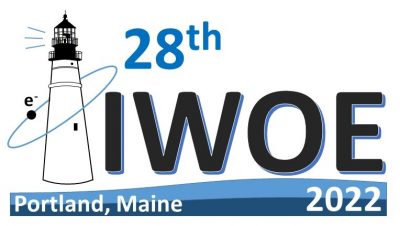
The full abstract book of the talks and posters can be found at https://iwoe28.events.yale.edu/sites/default/files/files/Abstract%20book_draft.pdf
Prof. Jonathan Trump Interviews about the James Webb Space Telescope
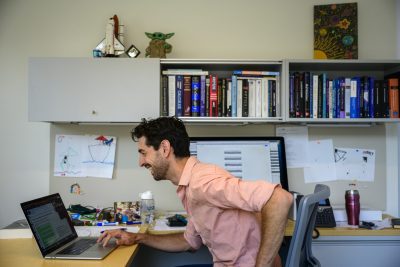 The James Webb Space Telescope released its first science observations on July 12 with much fanfare and excitement across the globe. UConn Physics Professor Jonathan Trump is part of the Cosmic Evolution Early Release Science collaboration that was awarded some of the first observations on the transformative new space telescope.
The James Webb Space Telescope released its first science observations on July 12 with much fanfare and excitement across the globe. UConn Physics Professor Jonathan Trump is part of the Cosmic Evolution Early Release Science collaboration that was awarded some of the first observations on the transformative new space telescope.
Prof. Trump was interviewed by several local media outlets, including NPR CT, WILI AM, and the Waterbury Republican-American, about the new James Webb Space Telescope observations and his research goals for the telescope. UConn Today also featured a story about the early JWST observations and scientific findings produced by Prof. Trump’s research collaboration.
Prof. Cara Battersby Awarded an NSF CAREER grant
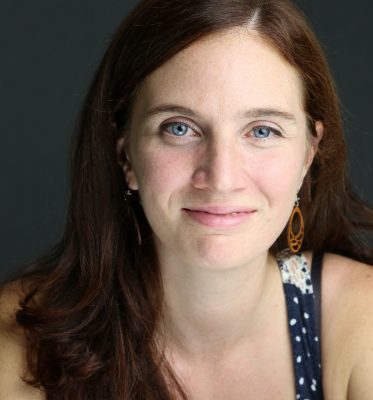 Professor Cara Battersby has been awarded an NSF CAREER grant! “The Faculty Early Career Development (CAREER) Program is a Foundation-wide activity that offers the National Science Foundation’s most prestigious awards in support of early-career faculty who have the potential to serve as academic role models in research and education and to lead advances in the mission of their department or organization.”
Professor Cara Battersby has been awarded an NSF CAREER grant! “The Faculty Early Career Development (CAREER) Program is a Foundation-wide activity that offers the National Science Foundation’s most prestigious awards in support of early-career faculty who have the potential to serve as academic role models in research and education and to lead advances in the mission of their department or organization.”
Prof. Battersby’s CAREER Award is entitled “CAREER: Shining STARs Amidst the Turbulence” and is an ambitious project to complete the first-ever systematic study of turbulence in an extreme environment, the center of our galaxy. Turbulence is poorly understood yet plays a pivotal role in the setting the Initial Mass Function (IMF), which underpins all of modern astrophysics. The results from this research will be brought into under-resourced high school classrooms through lesson plans jointly developed by K-12 teachers and undergraduate students from traditionally under-represented groups. Battersby aims to recruit and retain students from under-represented groups in STEM through a new mentorship program UConn-STARs.
Plates that Helped Map the Universe, Now at UConn
UConn is now home to tools that have played an instrumental role in mapping the universe — 10 large aluminum plates used as part of the Sloan Digital Sky Survey (SDSS). Measuring 32 inches across, one-eighth of an inch thick, and with thousands of tiny holes drilled in them, these plates may not be the type of instruments most people would initially picture; however, they have helped answer important questions about the universe.
Jonathan Trump, associate professor of physics, helped design the final round of plate observations for SDSS, which observed over three million objects in the sky, including stars, galaxies, and supermassive black holes from a telescope in New Mexico.
For more information, see the full UConn Today story here. This story was also featured in May edition of Connecticut Magazine (page 32).
Two Physicists are in Project Daedalus that Focuses on Materials for Aerospace in New $4.7 Million Contract
UConn’s collaboration with the Department of Defense Air Force Research Laboratory (AFRL) is launching a new project. It is titled Multiscale Modeling and Characterization of Metamaterials, Functional Ceramics and Photonics. This is a $4.7 M contract with $1M for Physics. The project’s goal is to explore and advance the understanding of electronic, photonic, magnetic, and multiferroic materials, with future applications in the aerospace industry. Two experimental condensed matter physicists Dr. Menka Jain and Dr. Ilya Sochnikov will contribute to the understanding of magnetic and multiferroic materials. The project supports 4 graduate Research Assistants in the Physics Department and is a unique life-transformative and career-building opportunity for them.
For more information, see UConn Today article
Research of UConn Professor Daniel Angles-Alcazar featured in UConn Today
The article The Largest Suite of Cosmic Simulations for AI Training Is Now Free to Download; Already Spurring Discoveries describe research of a team of astrophysicists that includes UConn Professor of Physics Daniel Anglés-Alcázar.
“Machine learning is revolutionizing many areas of science, but it requires a huge amount of data to exploit,” says Anglés-Alcázar. “The CAMELS (which stands for Cosmology and Astrophysics with MachinE Learning Simulations) public data release, with thousands of simulated universes covering a broad range of plausible physics, will provide the galaxy formation and cosmology communities with a unique opportunity to explore the potential of new machine-learning algorithms to solve a variety of problems.”
Prof. J. Trump interview about the launch of the James Webb telescope
UConn Physics Professor Jonathan Trump is part of a group of scientists who will be the first to conduct research using the James Webb space telescope. The local Fox News TV station conducted an interview with Prof. Trump.
The James Webb Space Telescope (JWST) was launched on December 25, 2021. The telescope is named after James E. Webb who was the administrator of NASA from 1961 to 1968 and played an integral role in the Apollo program. JWST is intended to succeed the Hubble Space Telescope as NASA’s flagship mission in astrophysics. It is designed to provide improved infrared resolution and sensitivity over Hubble, viewing objects up to 100 times fainter, and will enable a broad range of investigations across the fields of astronomy and cosmology.
U.S. Senators introduce a resolution to recognize the Arecibo Observatory Telescope
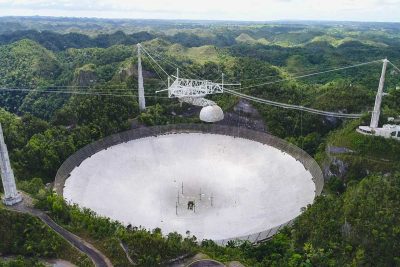
On Friday December 3rd, a group of U.S. Senators, Richard Blumenthal (D-CT), Edward J. Markey (D-MA), Marco Rubio (R-FL), Elizabeth Warren (D-MA), and Rick Scott (R-FL) introduced a bipartisan a resolution to recognize the significant scientific, educational, and economic contributions made by the Arecibo Observatory telescope.
“The telescope at Puerto Rico’s Arecibo Observatory was a scientific marvel, extensively expanding our understanding of the universe,” said Blumenthal. “Its collapse left a significant educational void for our country and the scientific community across the world. I’m proud to recognize its important contributions alongside my colleagues and express our strong support for further studies for how best to replace—and build upon—this telescope’s capabilities at the world-class Arecibo Observatory.”
Read more here, including a link to the full resolution. The research of several UConn physicists has greatly benefited from the Arecibo telescope over the years.
Prof. Chiara Mingarelli awarded NSF grant
Chiara Mingarelli, Assistant Professor of Physics at UConn, is the lead researcher on a $650,000 Collaborative Research Grant from the National Science Foundation, half of which is earmarked for UConn, to conduct an experiment to prove the existence of supermassive black hole binaries. This grant will combine, for the first time, traditional astronomy with gravitational wave astronomy.
“This project is really setting up a whole new way to think about low-frequency gravitational-wave and extragalactic astronomy,” Mingarelli says. “With our new method, not only can we make predictions about the amplitude of the gravitational wave background, but we can also make predictions of where the likeliest and closest supermassive black hole systems are.”
For more information about Prof. Mingarelli research, see the recent article in UConn Today.